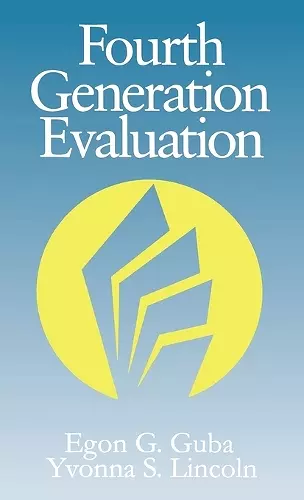Fourth Generation Evaluation
Yvonna S Lincoln author Egon G Guba author
Format:Hardback
Publisher:SAGE Publications Inc
Published:8th Dec '89
Currently unavailable, and unfortunately no date known when it will be back

"In Fourth Generation Evaluation, Guba and Lincoln present a strong, unequivocal argument for the epistemological, methodological, and ethical superiority of their refined constructivist inquiry paradigm for the political and practical demands of program evaluation."
--Jennifer Greene, Cornell University
"I would warmly recommend it as stimulating and challenging reading."
--Systems Practice
"I consider Fourth Generation Evaluation to be an exceptionally daring and insightful book. It has done more than most books to further loosen the grip of liberal, instrumental ′′common sense′′ (i.e., ideology) that has constricted the field of evaluation for the past 30 years. The book′s idealism is energizing and must only be matched, as the authors certainly know, by yet more hard-headed analysis. Its radical ambitions are inspiring if not always apparently achievable. However, fair is fair: radical ends demand radical means."
--Evaluation Practice
Fourth Generation Evaluation represents a monumental shift in evaluation practice. Guba and Lincoln point to the inherent problems faced by previous generations of evaluators--politics, ethical dilemmas, imperfections and gaps, inconclusive deductions--and lay the blame for failure and nonutilization at the feet of the unquestioned reliance on the scientific/positivist paradigm of research. Fourth Generation Evaluation, a more informed and sophisticated approach, moves beyond science to include the myriad human, political, social, cultural, and contextual elements that are involved. Based upon relativism, a unity between knower and known, and a subjective epistemology, the authors show how fourth generation evaluation unites the evaluator and the stakeholders in an interaction that creates the product of the evaluation. Differing from previously existing generations, this new approach moves evaluation to a new level, whose key dynamic is negotiation. The constructivist paradigm is espoused by the authors and shown to offer multiple advantages, including empowerment and enfranchisement of stakeholders, as well as an action orientation that defines a course to be followed. Not merely a treatise on evaluation theory, Guba and Lincoln also comprehensively describe the differences between the positivist and constructivist paradigms of research, and provide a practical plan of the steps and processes in conducting a fourth generation evaluation.
This is a book that no evaluator can afford to ignore and an important advance in the study of applied research.
ISBN: 9780803932357
Dimensions: unknown
Weight: 520g
296 pages